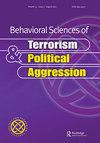Dying for the cause? The logic and function of ideologically motivated suicide, martyrdom, and self-sacrifice within the contemporary extreme right
IF 1.4
Q2 POLITICAL SCIENCE
Behavioral Sciences of Terrorism and Political Aggression
Pub Date : 2020-09-17
DOI:10.1080/19434472.2020.1822426
引用次数: 6
Abstract
ABSTRACT In recent years, extreme right-wing militancy and terrorism have increasingly become the major source of violent attacks, killings, and threats in many Western countries. Yet, the characteristics and logic of right-wing terrorism remain poorly understood. One aspect virtually unexplored is the apparent lack of suicide terror tactics within far-right terrorism. Suicide terrorism has been attributed mainly to religious and ethno-separatist terrorist organizations. This article explores the contemporary extreme right’s stance toward suicide, self-sacrifice, and martyrdom at the ideological, strategic, and subcultural levels through historic references to martyrdom in Nazi Germany and post-WWII far-right movements, as well as extreme right strategic manuals and ideological manifestos. In sum, this article argues that the extreme right is unlikely to use suicide attack tactics in the narrow sense since its own distinct sacrificial martyrdom mythology based on ideological steadfastness and a hypermasculine warrior identity of fighting until defeat incentivizes different types of attacks involving suicide, such as murder-suicides or mass shootings.为事业而死?当代极右翼中意识形态驱动的自杀、殉道和自我牺牲的逻辑和功能
摘要近年来,极右翼武装和恐怖主义日益成为许多西方国家暴力袭击、杀戮和威胁的主要来源。然而,对右翼恐怖主义的特点和逻辑仍知之甚少。一个几乎未被探索的方面是极右翼恐怖主义中明显缺乏自杀式恐怖策略。自杀式恐怖主义主要归因于宗教和民族分离主义恐怖组织。本文通过对纳粹德国和二战后极右翼运动中殉难的历史参考,以及极右翼战略手册和意识形态宣言,从意识形态、战略和亚文化层面探讨了当代极右翼对自杀、自我牺牲和殉难的立场。总之,本文认为,极右翼不太可能使用狭义的自杀式袭击策略,因为其独特的牺牲殉道神话基于意识形态的坚定性和战斗到失败的超男性战士身份,激励了不同类型的自杀式攻击,如谋杀自杀或大规模枪击。
本文章由计算机程序翻译,如有差异,请以英文原文为准。
求助全文
约1分钟内获得全文
求助全文
来源期刊

Behavioral Sciences of Terrorism and Political Aggression
POLITICAL SCIENCE-
CiteScore
4.80
自引率
10.00%
发文量
27
 求助内容:
求助内容: 应助结果提醒方式:
应助结果提醒方式:


